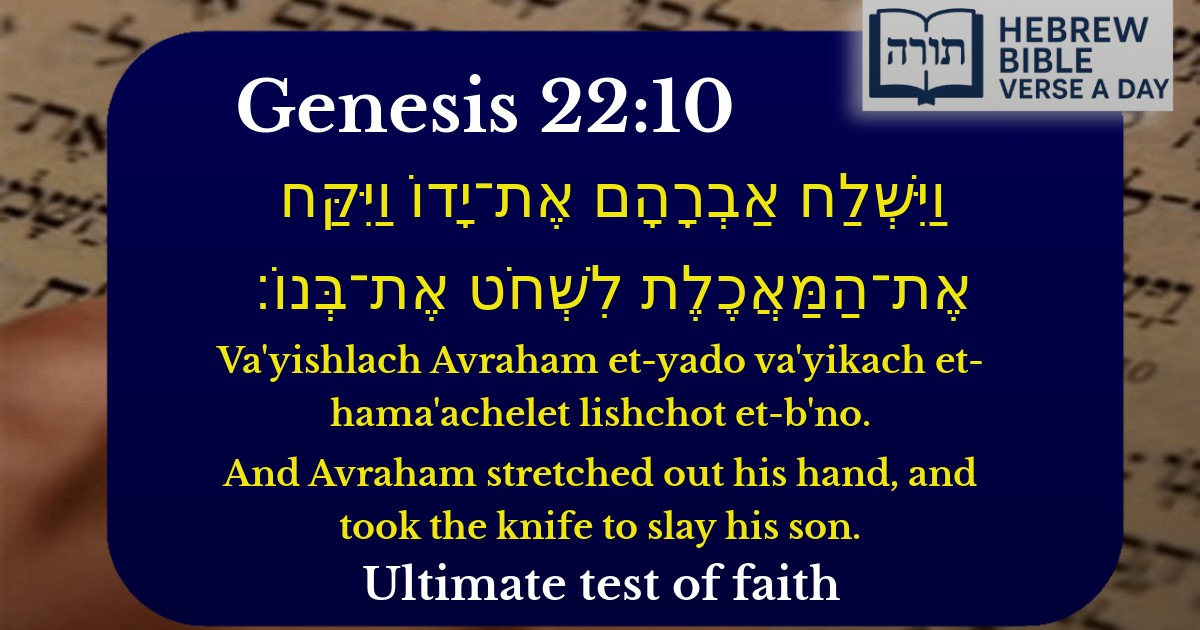Join Our Newsletter To Be Informed When New Videos Are Posted
Join the thousands of fellow Studends who rely on our videos to learn how to read the bible in Hebrew for free!
Hebrew Text
וַיִּשְׁלַח אַבְרָהָם אֶת־יָדוֹ וַיִּקַּח אֶת־הַמַּאֲכֶלֶת לִשְׁחֹט אֶת־בְּנוֹ׃
English Translation
And Avraham stretched out his hand, and took the knife to slay his son.
Transliteration
Va'yishlach Avraham et-yado va'yikach et-hama'achelet lishchot et-b'no.
Hebrew Leining Text
וַיִּשְׁלַ֤ח אַבְרָהָם֙ אֶת־יָד֔וֹ וַיִּקַּ֖ח אֶת־הַֽמַּאֲכֶ֑לֶת לִשְׁחֹ֖ט אֶת־בְּנֽוֹ׃
וַיִּשְׁלַ֤ח אַבְרָהָם֙ אֶת־יָד֔וֹ וַיִּקַּ֖ח אֶת־הַֽמַּאֲכֶ֑לֶת לִשְׁחֹ֖ט אֶת־בְּנֽוֹ׃
🎵 Listen to leining
Parasha Commentary
📚 Talmud Citations
This verse is quoted in the Talmud.
📖 Sanhedrin 89b
The verse is discussed in the context of the binding of Isaac (Akeidat Yitzchak), where the sages analyze Abraham's actions and the test of his faith.
📖 Ta'anit 4a
Mentioned in relation to the merit of the Akeidah and its significance in Jewish tradition and prayer.


The Test of Avraham
The verse (Bereishit 22:10) describes the climax of the Akeidah (Binding of Yitzchak), where Avraham demonstrates his complete devotion to Hashem by preparing to offer his son as a sacrifice. Rashi explains that Avraham's action was deliberate and unwavering, emphasizing the phrase "וַיִּשְׁלַח אַבְרָהָם אֶת־יָדוֹ" ("And Avraham stretched out his hand") as a sign of his wholehearted commitment to fulfill the divine command.
The Significance of the Knife
The machelet (knife) is a central symbol in this narrative. The Rambam (Moreh Nevuchim 3:24) teaches that the Akeidah served to demonstrate Avraham's absolute faith, rejecting human emotion in favor of divine will. The Midrash (Bereishit Rabbah 56:8) notes that the knife was specially prepared for this act, highlighting the meticulousness of Avraham's obedience.
Avraham's Internal Struggle
While the verse portrays Avraham's decisive action, the Talmud (Sanhedrin 89b) suggests that this moment was fraught with spiritual tension. The angels wept (Pirkei DeRabbi Eliezer 31), witnessing the profound test of faith. The Zohar (1:120a) adds that Avraham's love for Hashem overcame his natural paternal love, fulfilling the verse (Mishlei 23:26), "Give me your heart, my son."
Lessons from the Akeidah